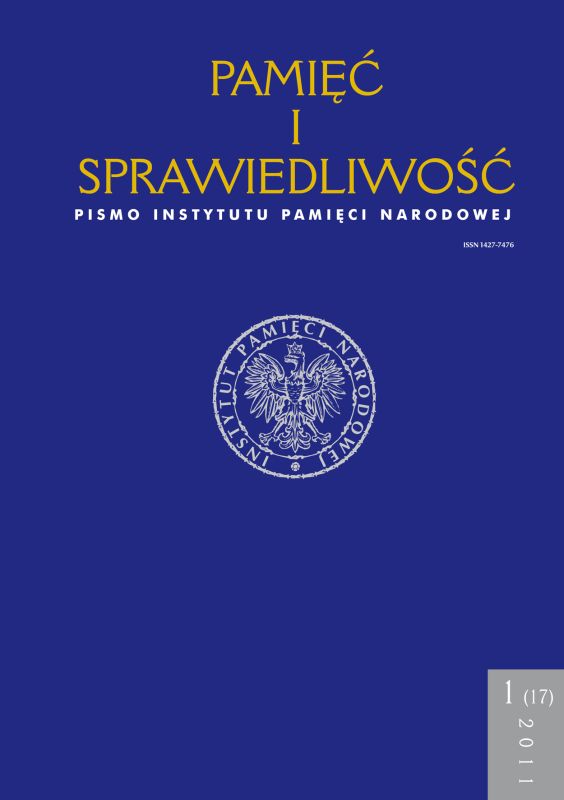Konspiracja młodzieżowa na ziemiach polskich w latach 1944–1956
Pamięć i Sprawiedliwość, Tom 17 Nr 1 (2011), strony: 47-74
Data publikacji: 2011-06-30
Abstrakt
Between 1944 and 1956 those of young people who expressed their opposition to the communist ideology and atheism present in everyday life and also to the permanent violation of freedom, made a decision to get involved in underground activity. According to the IPN’s records, they formed throughout the country at
least 972 clandestine organizations with 11 thousand members.
Newly created associations referred to various traditions (scouting movement, religion, Home Army, WiN [Wolność i Niezawisłość, Freedom and Independence], BCh [Bataliony Chłopskie, Polish Peasants’ Battalions], NSZ [Narodowe Siły Zbrojne, National Armed Forces], peasant and national movements).
In the youth’s conspiracy work three phases could be distinguished. The first one was a present activity of that time – preparation to the change of political system mainly due to an armed struggle. Young people gained military qualifications and conducted campaign aimed at educating conspiracy members
about the ongoing political situation and at formation of the civil attitude of the local communities (in leaflets – rather than in the underground press – they appealed to people to preserve their national identity, to maintain resistance and to remain independent of official propaganda’s influence). The next
planned phase was to be an direct involvement in military struggle against the enemy, at the side of Polish Army advancing form the West, leading to a restoration of the independence of the country.
There were however two major categories of associations – military and scout. Józef Piłsudski was chosen the ideological patron of some of them, whereas others referred to the national conceptions or even to the theory of socialism simultaneously rejecting its contemporary concept.
They youth conspiracy activists had vision of the Poland’s future. It was to become democratic country, guaranteeing political and economic freedom and civil liberties.
Regardless of the fact that during the first decade of Peoples’ Republic of Poland the youth conspiracy members were not numerous, they were those who – after the defeat of “adult underground” – took over an heritage of an anticommunist
resistance: gros grup (about 66 per cent) was active between the years 1949 and 1953.
Inne teksty tego samego autora
- Jacek Wołoszyn, Dieter Pohl, Bogdan Musiał, [Recenzja] Dieter Pohl, Von der „Judenpolitik” zum Judenmord. Der Distrikt Lublin des Generalgouvernements 1939–1944, Verlag Peter Lang GmbH, Frankfurt am Main–Berlin–Bern–New York-Paris–Wien 1993, ss. 208 i Bogdan Musial, Deutsche Zivilverwaltung und Judenverfolgung im Generalgouvernement. Eine Fallstudie zum Distrikt Lublin 1939–1944, Verlag Harrassowitz, Wiesbaden 1999, ss. 435 , Pamięć i Sprawiedliwość: Tom 6 Nr 2 (2004)
- Jacek Wołoszyn, Propagandowa rola procesów członków konspiracyjnych organizacji młodzieżowych w latach 1948–1956 , Pamięć i Sprawiedliwość: Tom 43 Nr 1 (2024)
- Jacek Wołoszyn, Reakcja prasy konspiracyjnej na wydarzenia w Zamojskiem z lat 1942–1943 , Pamięć i Sprawiedliwość: Tom 2 Nr 2 (2002)
- Jacek Wołoszyn, Współpraca Związku Młodzieży Polskiej z UB w realizacji planów „ofensywy ideologicznej” w środowiskach młodzieżowych w województwie lubelskim , Pamięć i Sprawiedliwość: Tom 12 Nr 1 (2008)
- Jacek Wołoszyn, Członkowie Związku Młodzieży Polskiej w województwie lubelskim wobec Kościoła katolickiego – przyczynek do dziejów mentalności młodzieży , Pamięć i Sprawiedliwość: Tom 7 Nr 1 (2005)
- Jacek Wołoszyn, „Ostra broń” – agentura celna. Tajni współpracownicy w więzieniach i aresztach śledczych w latach 1944–1956 , Pamięć i Sprawiedliwość: Tom 16 Nr 2 (2010)
- Jacek Wołoszyn, Udział organów bezpieczeństwa w akcji rekrutacji na studia w województwie lubelskim w latach 1947–1956 , Pamięć i Sprawiedliwość: Tom 11 Nr 1 (2007)
 Język Polski
Język Polski
 English
English
 Deutsch
Deutsch
 Français (France)
Français (France)
 Italiano
Italiano
 Русский
Русский


 PDF
PDF
